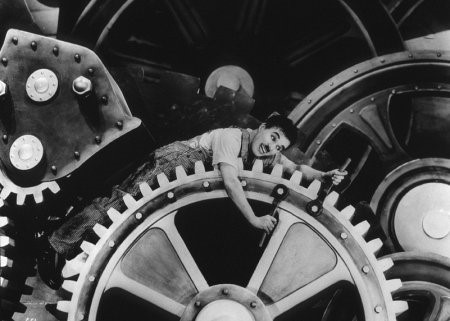Main Content
Lesson 2: The Development of Cinematic Language
Technology, Humanity, and Modernity

In our critique of Modern Times today, we'll try and think about some of the issues that we dealt with in the previews, including Chaplin's growing concerns about technology dominating over humanity in modernity, and the impact of a certain type of industrial production, namely Fordism and Taylorism. He saw both as being a huge problem in the modern world, especially within the context of the Great Depression. These were well under way by the time that Modern Times was made.
We'll also think about this film in relation to Chaplin's own aesthetic commitments to silent film. Remember, that Chaplin was a strangely conservative filmmaker in that he believed that sound, or at least talking, in movies would forever alter film. In many ways this film was a commentary on the talking picture. The places where one hears speaking in this film are very significant.
Figure 2.15 is a very iconic image of the Little Tramp being eaten by the machine after losing his mind.
Antonio Gramsci, a Marxist philosopher who was very interested in the impact of this new type of industrial labor that was being created in the 1920s and 1930s, stated, “The history of industrialism has always been a continuing struggle (which today takes an even more marked and vigorous form) against the element of ‘animality’ in man.” (Americanism and Fordism, 1932).
In many senses, his concern about the man versus machine, or the human versus the machine, is present in Modern Times. It’s that the machine will always be in contrast with the animal or human element to mankind.
After Modern Times, Chaplin made The Great Dictator. Many say that this was the last film that the Little Tramp existed, even though it was a different form. It was the Little Tramp as a Jewish barber. But this was a film in which Chaplin actually spoke out for the first time in. This quote is from his final speech given at the end where Chaplin was making a cry against fascism and the type of modernity associated with it.
"We have developed speed but we have shut ourselves in: machinery that gives us abundance has left us in want. Our knowledge has made us cynical, our cleverness hard and unkind. We think too much and feel too little: More than machinery we need humanity; more than cleverness we need kindness and gentleness. Without these qualities, life will be violent and all will lost."
All these themes are also in Modern Times but rendered in a more comic way. Recall that Chaplin always believed that comedy and tragedy were very close to one another.
